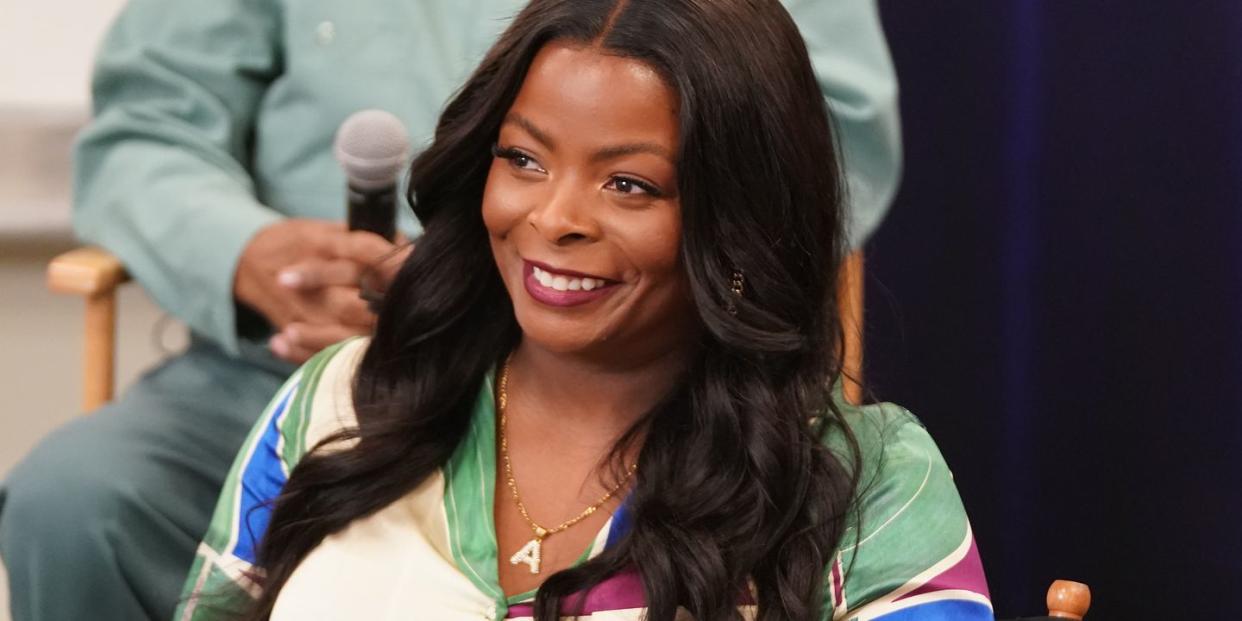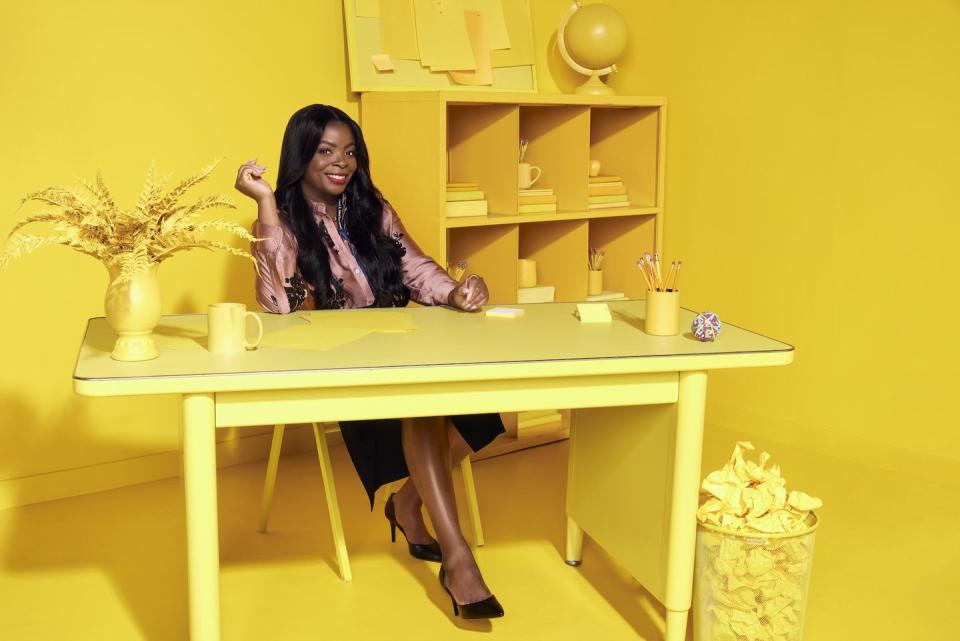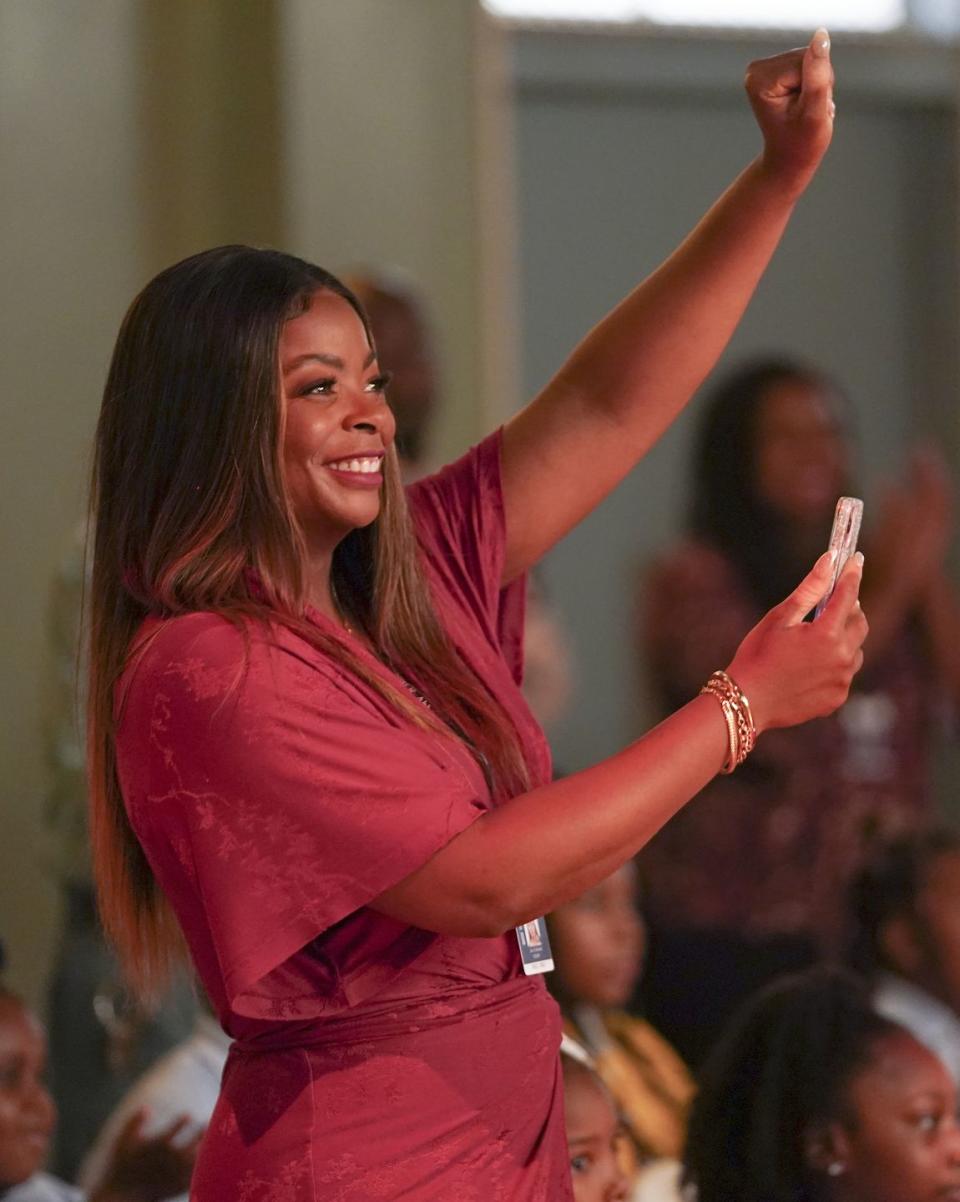Janelle James Is Just Happy to Be Here

- Oops!Something went wrong.Please try again later.
- Oops!Something went wrong.Please try again later.
- Oops!Something went wrong.Please try again later.
- Oops!Something went wrong.Please try again later.
- Oops!Something went wrong.Please try again later.
Like all good comedians, Janelle James knows that timing is everything. More than a decade after beginning her career as a stand-up comedian at an open mic night in Illinois, James—who has since toured with Chris Rock and Amy Schumer, and cut her teeth as a writer-turned-actress on Showtime’s Black Monday and Apple TV+’s Central Park—landed the role of a lifetime in Abbott Elementary, the acclaimed ABC sitcom about a group of effervescent educators at an underfunded Philadelphia public school.
In the Emmy-winning workplace comedy, which premiered its sophomore season last month, James plays Ava Coleman, the school’s hilariously inept (and fan-favorite) principal who seems more interested in expanding her social media brand than alleviating the concerns of her overworked teachers. But on a recent day off from filming a more Ava-centric episode, James wanted to make one thing clear: “Ava does contribute to the school in her own way … and in good ways.”
In a recent interview from Los Angeles, James spoke with BAZAAR.com about the joy of playing a “chaotic” character that audiences will hate to love, the understated power of comedy to tackle real-world issues, the surreal experience of being nominated for her first Emmy, and the teachers who had the biggest impact on her (even if she can’t remember their names anymore).
How would you describe Ava’s relationships with the other five teachers?
[With] Barbara (Sheryl Lee Ralph) and Melissa (Lisa Ann Walter) being the senior teachers, I think she respects them and also knows that she needs them, because they actually know how to run the school and what needs to be done, so she can’t get on their bad side. [With] Janine (Quinta Brunson), Gregory (Tyler James Williams), and Jacob (Chris Perfetti) being the newbies, and her being a kind of alpha personality, she has no respect for them yet.
In the first episode—I forget which character talks about how people come and go, a lot of teachers don’t even make it, so I feel like Ava was like, “None of these teachers might even be around next year, so why would I even waste my time being nice to them?” They can’t help her out, and they might not stick around, so why even expend the energy? And then Janine is a snitch, so she might never forgive her.
Like many of the characters, Ava has a habit of playing to the cameras from time to time. What do you think is the key to mastering the art of looking straight at the camera in a mockumentary, and how would you say that is indicative of Ava’s character?
I don’t know about mastering, but I just always try to remember that Ava is the reason that the cameras are there, so that’s always a thought in my head—as far as how she interacts with them, how she moves, where she positions herself, and how she wants herself to look in this documentary that she made happen. So that informs a lot of the looks and stuff she gives.
I’ve never shot a mockumentary before. I’d only had one small part in Black Monday. I did a guest-starring role, and that was kind of an ideal situation, because I was also a writer there, and so it was very supportive. Everyone was so psyched for me to do this part. It was almost kind of a joke that I was being written into this show. [Laughs.] So I don’t even count that as a real acting experience, because they were so in my corner. I know [in] most shows, the cardinal sin is to look at the camera. [But] I didn’t have to unlearn anything as far as not looking in the camera or anything like that.

Ava doesn’t interact as much with the children on this show, but there are a few who have gone toe-to-toe with her, like Courtney (Lela Hoffmeister), or have pointed out her hilarious ineptitude as a school administrator. What is it like working with the various child actors on this show?
They’re all just little people. I just treat them like kids. … I try to make sure that it’s not a drag for them, because that would suck. I don’t want them to feel like they’re at work, so I’m always just trying to have fun, and probably to Quinta’s dismay. I’m always riling up the kids trying to do fun stuff.
What I’ve noticed this season is, the kids know the show. And so, we have new kids come in and they think I’m this Ava character, so they think I’m mean! And that’s been a thing where I’m like, “Hey, no. I’m Janelle, just playing this other person. So you don’t have to be afraid of me or think that you’re gonna get in trouble, because I’m [not] the real principal.”
The fact you have been able to discuss such timely issues in a way that feels very subtle and true to life is a testament to the work of Quinta and the writers’ room, but why do you think comedy is such a great vehicle to discuss current issues, such as the underfunding of public education?
Well, that’s one form of comedy that I like and what I did [previously] in my stand-up. It always is easier to have someone listen to you if you disarm them with the laughter first. It seems like a “duh” kind of thing, but it’s hard to do. So I know for a stand-up, one of my favorite things was being in front of an audience that I know for a fact had never seen someone like me, maybe had never had to even listen to a woman speak for any length of time—willingly. [Laughs.] And being able to break down those barriers with those people, to have them go from arms crossed and beady-eyed to laughing—that’s so powerful.
And comedy is powerful, and that’s why it works in this way, but it’s hard. I’m glad that the comedy in this show is getting the respect that it is, because as Rodney Dangerfield says, “We don’t get no respect,” to bring a saying from way back. But it still stands. Comedians don’t really get [respect]. Everyone thinks it’s easy; everyone thinks they’re funny. But as we all know from talking to people who are a drag, that is not true.
You’ve mentioned in past interviews that you grew up with family members, such as your father, who were very unintentionally funny. How would you say your upbringing has influenced your comedy?
I’m the oldest of nine, so I know I need to be heard over all the ruckus, and I think I’m less of a clown and more of a nerd. I’ve always been, like, a book-smart person; I’m very into language and reading, and that really lends itself to comedy, because you have to know how to communicate. So that’s really what I’m most into as far as comedy—one, making people laugh, and then sneaking ideas into that laughter. … I think my upbringing—being very strict about school and learning—is what truly lended itself to my comedy, not the fact that I was a clown, because I wasn’t at all. I wasn’t an outspoken person in class or a goof at all growing up, but we are from the [Virgin] Islands. We are a loud people. And my dad and some of my aunts are just very outspoken, but they’re not trying to be funny. They just are.
I think it is because we’re all very smart, we all hustle in working people. When you grow up poor and you work hard, your relaxation comes from laughter. It’s such a free vacation. So you will find the most marginalized, and seemingly who should be depressed, people [are the ones] who have the most fun, and that’s how my family was as well.
Your family must be so proud and over the moon about all the success that you’ve had in the last year.
Oh, they love it, of course! Everyone wants to let everyone know they’re related to me. This is the first thing, I think, that I’ve done that my mom can watch without wincing, so that’s good—the first PG thing. I know my mother has always just been supportive of me in whatever I do, so none of them are surprised. I’ve bounced around to so many different careers and even different things in comedy—writing and stand-up and now this. They’re not shocked. My mother is always like, “Yeah, that’s just what she does.” So they’re all just super proud of me and into the show, which is great.

You didn’t always expect to pursue a career in acting, but it felt like a natural progression after a decade of work as a stand-up comedian. What are some things you wish you had known about how scripted television is made that you maybe didn’t know when you were just working as a writer behind the scenes?
You kind of learn as you go, and personally, it took me until maybe the third or fourth episode before I knew what a mark was. I didn’t know I was not standing on my mark, and it’s not even [like] anyone told me. I was just looking at the ground one day, and I was like, “Wait a minute … [laughs], are we supposed to be standing on [our marks]?!” And I think it was Sheryl who was like, “Yeah.” And I looked and everyone was standing on their color, and I was like, “Wait ... am I orange?!”
I was just coming in and standing where I thought I should be, and I just happened to be kind of correct, so nobody ever had to tell me, but it wasn’t until I saw this person doing the tape and everybody moving into their position that I was like, “Oh, am I supposed to be doing that?” So maybe I wish I knew that before, but it didn’t matter; I learned it, just like everything else that I’m doing.
You’ve spoken in the past about how, for better or for worse, you don’t remember any of your principals. But growing up, did you have a favorite teacher who helped you get to where you are now? If so, what kind of impact did they have on you?
I don’t remember principals—I really don’t! I do remember I had a really strict English teacher in high school that, if I try to remember her now, I felt like I hated her, and I was just like, “Oh, I hate this lady. She’s so strict. Why does organization even matter? Why are we reading this stuff?” It was just like every cliché movie. It wasn’t until I was out of high school that I was like, “Oh, that teacher really taught me a lot, and I’m glad that she made me buckle down. And organization is a problem that I have.” But I don’t remember her name, because I think I hated her then!
And then, I had another teacher—and this actually was in college. I got all the way through high school hating math, and I remember I had a math professor that, for whatever reason, just took time to teach me math, and I think this was maybe trig or something. … No, was it calculus? Anyway, [he] just took the time to teach me in a way that, when I think about it now, I felt like my brain unlocked. Math is like a breeze to me now, so I’ll never forget that. I remember being in college, and I was already a mom then and everything, and coming home and putting my math test next to my kids’ kindergarten math tests. Like, “I also got an A!” Which had never happened in math. So that guy, who I also don’t remember, was a great teacher.
After Amy Poehler called Sheryl Lee Ralph’s name at the Emmys, Sheryl was in a momentary state of shock and disbelief, and then she turned to you and appeared to mouth, “Thank you.” What do you remember from that moment? Did either of you discuss the magnitude of having two Black women nominated in one of the strongest categories at the Emmys?
I don’t know if she mouthed anything at me. I know she was shocked. I know we did not discuss [the nominations]. The lead-up to the Emmys is such wildness, and also, this is my first go-around of any of this—not only the Emmys, but an awards show. Even knowing what that is, knowing what I’m supposed to do, having to represent a group of people, being nominated. It was like [everything] all at once.
So I saw her shocked and not moving, and I was like, “Wait, you gotta get up there!” So I just got up and helped her get to the stage, but after that, the whole Emmys for me, the ceremony itself, other than seeing myself onscreen and looking at Ben Stiller laughing at a clip of me, I don’t remember anything else. So that was like, “Oh, my God, that’s happening.” But the rest was like being underwater, if I could describe it any other way. I was just like, “This is crazy that I’m here, that I’m nominated. I’m sitting next to Sheryl Lee Ralph. My best friend is here.” It was just wild.
Chris Perfetti told me that the reason he had the day off a couple weeks ago was because you guys were shooting more of an Ava-centric episode. What can you preview about that episode in particular, and what have you enjoyed the most about seeing Ava’s continued evolution?
I’ve enjoyed most that she hasn’t really changed, that the jokes are still coming fast and furious. The outfits are also even better. And what can I tell you about the episode? Well, there is more revealed about how Ava does contribute to the school in her own way … and in good ways.
This interview has been edited and condensed for length and clarity.
Abbott Elementary airs Wednesdays at 9 p.m. ET on ABC.
You Might Also Like

